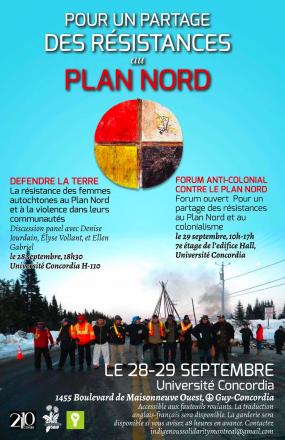When: Saturday the 29th of September, 10 am-5 pm
Where: the 7th floor of Hall, at Concordia University, 1455 boulevard de Maisonneuve West
The event will take place in two stages: a panel on Friday evening with indigenous women involved in resistance to colonialism, followed by an open forum on Saturday for sharing our strategies, with workshops and spaces for discussion. If you already have a workshop you would like to present on Saturday, you will be able to propose it during the open forum. The forum will serve to verbalize our paths of sharing and discussion, on an anti-capitalist and anti-colonial basis.
Since the beginning of 2012 a new plan for the colonization of the North American territory has been initiated: the Plan Nord. The political and capitalist class are attempting to sell a fantasy discourse, describing untouched territories that are ready to be developed, new frontiers to be expanded, and a quasi-mysterious space to be modeled to meet our desires. This is how they prepare for the cultural and environmental destruction of the peoples of the North.
Throughout this same year, there were numerous acts of resistance by indigenous people against the Plan Nord and its specific projects, including foresty, hydroelectric dams, and mining. People are speaking up against the Plan Nord, among the Innu, the Algonquins, the Crees, and also the Atikamekw. As well, many events took place in the cities of the south, such as during the Salon du Plan Nord in Montreal, where there were moments of intense confrontation.
The current motor of colonialism is called profit, and its principal movement is toward the concentration of wealth. Its motive is to dispossess the resources of the land, for investment in the tools of this dispossession: the state and the private-sector. In this way, the emergence of resistance to Plan Nord within the student movement was inevitable. To resist a project for the liberalization of the economy, it is necessary to talk about how we're relating to the land and the people who live on it. We invite you to share your knowledge and your experiences, to build links that will allow us to better understand our strengths and weaknesses. We invite you to come share your resistance.
